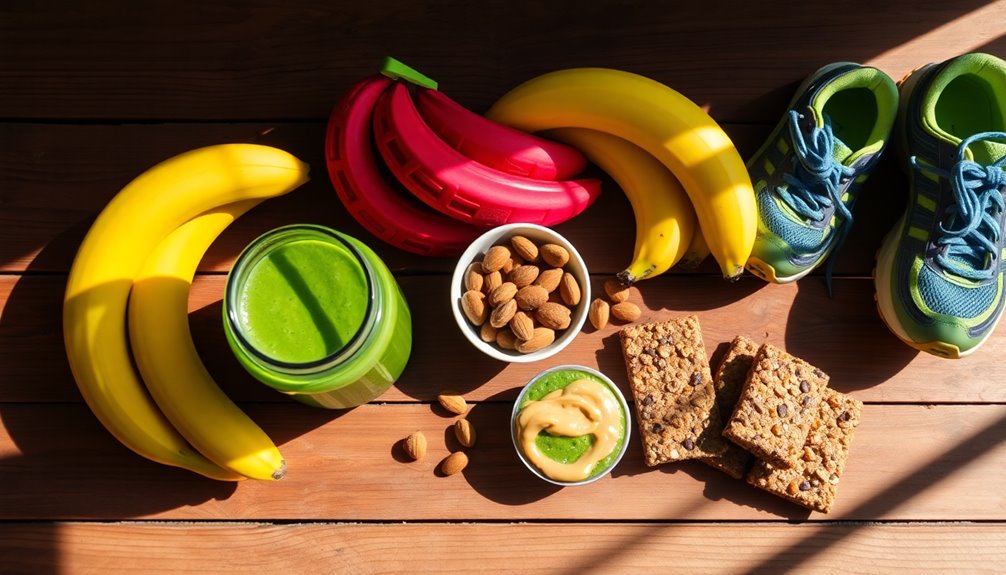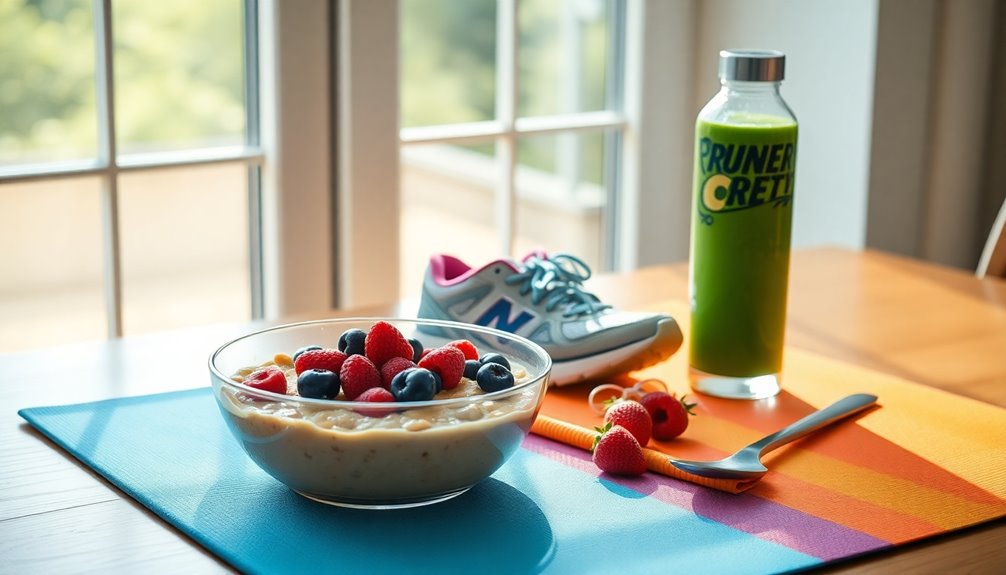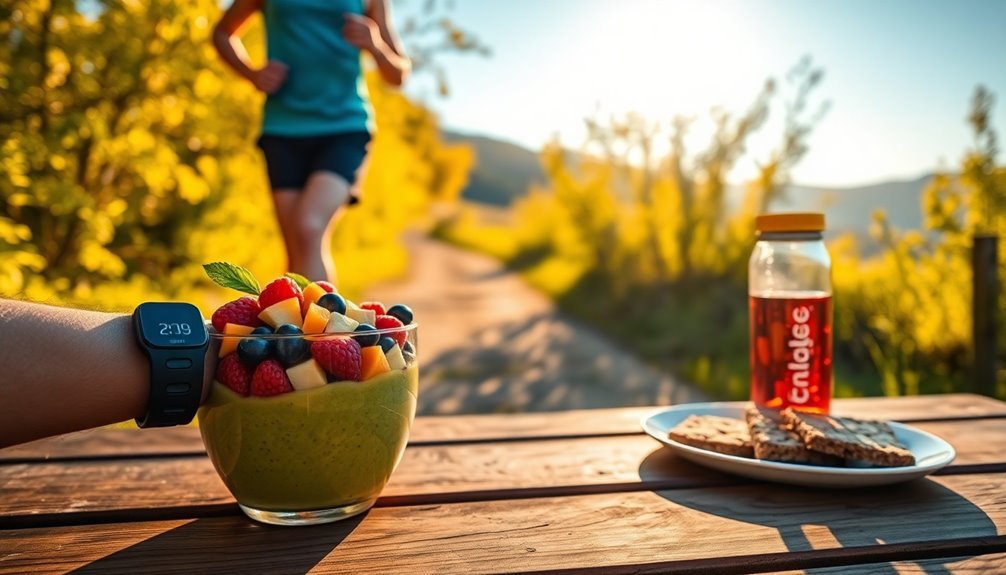To fuel your runs effectively, eat easy-to-digest carbs like toast or a banana about 1-2 hours before. If you're going for a long run, aim to consume 30-60 grams of carbs per hour and stay hydrated with water or electrolyte drinks. After your run, refuel within 30-60 minutes, focusing on carbs and protein for recovery. Proper nutrition is key for performance, and there's plenty more to take into account for your fueling strategy.
Key Takeaways
- Consume easy-to-digest carbohydrates like toast or bananas 1-2 hours before running for optimal pre-run energy.
- For long runs, aim for 30-60 grams of carbs per hour to maintain energy levels.
- Refuel within 30-60 minutes post-run with 1-1.2 grams of carbs and 0.4 grams of protein per kg of body weight.
- Stay hydrated by drinking 8-16 oz of water 1-2 hours before running and replenish with 16-20 oz post-run for every pound lost.
- Avoid spicy, high-fat, and high-fiber foods before running to prevent gastrointestinal issues and sluggishness.
What to Eat Before a Run

What should you eat before a run to fuel your performance? Carbohydrates are your best friend. Aim to consume easy-to-digest carbohydrates 30 minutes before you hit the pavement. A slice of toast or a banana can give you that quick energy boost. Additionally, it’s important to avoid heavy or greasy foods that may weigh you down during your run. Hydration also plays a key role, so make sure to drink water alongside what to eat before a run to keep your body adequately fueled. Ultimately, finding the right balance of carbohydrates will help enhance your endurance and overall performance on the track.
If you're planning a longer run, make sure to load up on carbs 24-36 hours in advance. A toasted bagel with peanut butter and banana is a fantastic choice.
For runs under an hour, target 1-1.2 grams of carbohydrates per kg of your body weight. Don't forget to hydrate—drink 8-16 oz of water before you run to keep your body primed and ready.
Additionally, consider incorporating family-friendly amenities into your routine, as staying active with loved ones can enhance your overall motivation and enjoyment of running.
Proper nutrition can make all the difference in your performance!
Long Run or Session Nutrition

When you're gearing up for a long run or high-intensity session, nutrition plays an essential role in your performance. To maximize your glycogen stores through carb loading, follow these guidelines:
- Pre-Run Nutrition: Consume carbohydrates 24-36 hours before your run, aiming for 1-1.2 grams of carbs per kilogram of your body weight for runs under an hour.
- During the Run: For runs lasting over 60-90 minutes, intake 30-60 grams of carbs per hour to maintain your energy levels and avoid hitting the wall.
- Post-Run Recovery: Refuel within 30-60 minutes with a mix of 1-1.2 grams of carbs and 0.4 grams of protein per kilogram for ideal recovery.
Don't overlook hydration—drink 10-24 ounces of fluid per hour based on your needs!
Morning Run Fueling Tips

Before your morning run, it's essential to fuel up with the right foods to boost your energy levels.
Think easy-to-digest carbs like toast or bananas, and don't forget to hydrate properly with a diluted sports drink.
Timing your meals is key—wait a bit after eating to keep cramps at bay and guarantee a smoother run. Additionally, remember that necessary cookies are essential for site functionality and can enhance your overall browsing experience, just like proper nutrition enhances your running performance.
Ideal Pre-Run Foods
Finding the right pre-run foods can make all the difference in your morning runs. To optimize your energy levels, focus on ideal pre-run foods that combine carbohydrates and protein.
Here are three great options:
- Toast with nut butter: This combo offers quick-digesting carbs and healthy fats, fueling your run without weighing you down.
- Banana with fruit yogurt: The banana provides essential carbohydrates, while yogurt adds protein for sustained energy.
- Scotch pancakes: Easy to digest, they deliver a satisfying carb boost just before you hit the pavement.
Aim to eat these options 1-2 hours before running, or grab a quick snack 30 minutes prior if you need an extra energy boost. Additionally, incorporating whole, unprocessed foods into your diet may enhance overall performance and recovery.
Happy running!
Hydration Strategies Before Running
Hydration plays a vital role in your performance during morning runs, so it's important to start your day with the right fluids. Aim to drink 8-16 oz of water 1-2 hours before you hit the pavement to guarantee optimal fluid levels.
For added energy, consider a carbohydrate-rich electrolyte drink, targeting 1-1.2g of carbohydrates per kg of body weight if your run's under an hour. Wait 1-2 hours after a small meal or snack before running to avoid gastrointestinal issues.
If you're planning a longer run, hydrate with water or electrolyte drinks every 15-20 minutes to maintain performance.
Finally, steer clear of dehydrating beverages like caffeine or alcohol before your run to keep your hydration strategies effective.
Timing: When to Run After Eating

Timing your runs after eating is essential for both performance and comfort. To optimize your runs, follow these guidelines:
- Snacks or Small Meals: Wait 1-2 hours before running. This allows for proper digestion and energy utilization.
- Larger Meals: Aim for a 3-4 hour wait. This prevents gastrointestinal discomfort, letting you focus on your run.
- Be Patient: Rushing can lead to cramps and indigestion, which can hinder your performance.
Fasted Running: Pros and Cons

While some runners swear by fasted running for its potential fat-burning benefits, it's essential to weigh the pros and cons before incorporating it into your training.
Fasted running can enhance fat utilization for fuel, which may boost your endurance performance. However, it's recommended to limit these sessions to 2-3 times a week to avoid excessive fatigue.
Keep your fasted runs under 90 minutes and maintain an intensity at or below 60% of VO2 max to prevent negative impacts on performance.
Remember, fasted running shouldn't mean a permanent low-carb diet; it should fit into a balanced nutrition plan.
Finally, make sure you replenish glycogen stores post-training to support your recovery after those fasted runs.
What to Eat After a Run

After a run, you need to focus on refueling to aid recovery.
Aim to eat within 30-60 minutes, targeting the right balance of carbohydrates and protein for best results.
Don't forget to hydrate, as replacing lost fluids is just as essential for your recovery process.
Recovery Nutrition Essentials
To optimize your recovery after a run, refueling should start within 30-60 minutes. Focus on a combination of carbohydrates and protein to support muscle repair and replenish glycogen stores.
Here are some recovery nutrition essentials to take into account:
- Carbohydrates: Aim for 1-1.2 grams per kilogram of your body weight. Options like chocolate milk or a banana can work wonders.
- Protein: Include around 0.4 grams of protein. Greek yogurt with granola or a protein shake is great.
- Hydration: Don't forget to rehydrate! Drink water or an electrolyte drink to replace lost fluids.
Following up with a balanced meal within two hours, like grilled chicken with quinoa and vegetables, will further enhance your recovery. Additionally, incorporating high-protein options such as cottage cheese or protein shakes can significantly aid in muscle repair.
Timing for Refueling
Refueling promptly is key to maximizing your recovery after a run. The timing for refueling should start within 30-60 minutes to restore glycogen stores effectively.
Aim for a carbohydrate intake of 1-1.2g per kg of body weight, paired with 0.4g of protein to enhance muscle repair. Good post-run nutrition options include recovery snacks like chocolate milk, Greek yogurt with granola, or a protein shake, followed by a balanced meal within two hours.
Don't forget hydration; drink water or a sports drink to replace fluids lost through sweat. Delaying your nutrition strategy can increase perceived exertion and lead to fatigue or injury, so prioritize timely refueling for peak performance recovery.
Importance of Hydration for Runners

Hydration plays an essential role in your running performance, as even mild dehydration can hinder your endurance and lead to increased fatigue.
To optimize your hydration strategy, consider these key points:
- Pre-Run: Aim to drink 8-16 ounces of water 1-2 hours before your run to guarantee you're well-hydrated.
- During Your Run: For runs longer than 60 minutes, consume 10-24 ounces of fluid per hour based on your sweat rate and conditions.
- Post-Run: Replenish yourself with 16-20 ounces of fluid for every pound lost during exercise, aiding recovery and reducing muscle soreness.
Don't forget that electrolyte drinks can help restore lost minerals, keeping your hydration levels balanced and your muscles functioning well.
Essential Vitamins and Minerals for Runners

As you push your limits on the track or trail, the right vitamins and minerals become essential for supporting your body's demands.
Calcium and vitamin D are critical for bone health, especially for women; include fortified dairy and fatty fish like salmon in your diet.
Iron plays an important role in oxygen transport, so consume iron-rich foods like poultry, legumes, and dark leafy greens to avoid deficiency.
Antioxidants from fruits and vegetables help combat oxidative stress and enhance recovery.
B vitamins, including B6, B12, and folate, are key for energy metabolism and red blood cell formation.
Finally, don't overlook magnesium; it supports muscle function and energy production. Additionally, consider incorporating anti-inflammatory herbs like turmeric and ginger into your diet to further support your recovery and overall health.
Prioritize these essential vitamins and minerals for runners to optimize your performance.
Foods to Avoid Before Running

Proper nutrition plays an essential role not just in fueling your runs, but also in ensuring you avoid discomfort while hitting the pavement.
To maximize your performance, steer clear of these foods to avoid before running:
- Spicy Foods: They can trigger gastrointestinal upset, making your run uncomfortable.
- High-Fat Foods: These take longer to digest and might leave you feeling sluggish or cramping.
- High-Fiber Foods: They can increase gas production, leading to cramping during your workout.
Additionally, limit caffeine, as it may stimulate your gastrointestinal tract, and avoid heavy meals within 3-4 hours before running.
Recovery Nutrition Strategies

To recover effectively after your run, you need to refuel within 30-60 minutes. Focus on a balanced intake of carbohydrates and protein to help repair muscles and restore energy. Additionally, incorporating anti-inflammatory foods can further enhance your recovery and reduce muscle soreness.
Optimal Post-Run Timing
Immediately after your run, refueling is essential to kickstart recovery and muscle repair. To achieve the best post-run timing, aim to start your recovery within 30-60 minutes.
Focus on these key strategies:
- Carbohydrates and Protein: Consume 1-1.2 grams of carbohydrates per kilogram of body weight and 0.4 grams of protein right after running.
- Recovery Snacks: Ideal options include chocolate milk, Greek yogurt with granola, or a protein shake with dairy or oat milk.
- Hydration: Replace lost fluids by drinking water or electrolyte drinks.
Following your initial snack, make sure to enjoy a balanced meal within two hours to replenish glycogen stores and support recovery. Additionally, consider including foods that contain monocalcium phosphate to enhance nutritional value and support overall health.
Prioritize these strategies for effective post-run recovery!
Essential Recovery Nutrients
While you've just completed a challenging run, the nutrients you consume next play an essential role in how quickly and effectively your body recovers. Aim for 1-1.2 grams of carbohydrates per kilogram of body weight, along with 0.4 grams of protein. Refueling within 30-60 minutes can greatly enhance recovery.
Here's a quick reference for recovery options:
| Recovery Snack | Nutritional Benefits |
|---|---|
| Chocolate Milk | Combines protein and complex carbs |
| Greek Yogurt with Granola | Provides probiotics and fiber |
| Protein Shake | Quick protein source for muscle repair |
| Balanced Meal | Lean protein, complex carbs, and veggies |
Don't forget hydration—drink 16-20 ounces for every pound lost. Prepare your post-run fuel in advance to avoid delays! Additionally, incorporating a protein-rich option like Egg Rollup and Dumpling Sauce can further support your recovery efforts.
Frequently Asked Questions
What Should I Eat Pre and Post Long Run?
Before your long run, you should eat a carbohydrate-rich meal, like oatmeal with fruit or a bagel topped with peanut butter, about 2-3 hours prior. This'll fill your energy stores.
After your run, refuel with a combination of carbohydrates and protein, such as Greek yogurt with granola or a protein shake, within 30-60 minutes.
Don't forget to hydrate; aim for 16-20 oz of water for every pound lost during your run.
What Are the Best Fuel Foods for Runners?
When you're fueling for a run, focus on quick-digesting carbohydrates like bananas, bagels, or energy bars. These provide the energy you need.
Post-run, combine carbs with protein to aid recovery; think chocolate milk or Greek yogurt with granola.
Don't forget hydration—drink plenty of water or electrolyte drinks before and after your run to keep your performance on point and help your body recover effectively.
How Do You Fuel Your Body Before Running?
Picture your body as a finely-tuned engine, ready to roar. To fuel it before running, you need the right blend of carbohydrates.
Grab a toast or a banana—something easy to digest—about 1-2 hours beforehand. Hydrate with 8-16 ounces of fluid, like water or a diluted sports drink, to keep your engine running smoothly.
What Is the Best Nutrition for Runners?
The best nutrition for runners focuses on a balanced intake of carbohydrates, proteins, and fats.
Aim for 60%-70% of your calories from carbs to fuel your runs effectively.
Before running, eat a carb-rich meal 2-3 hours prior, or a light snack if you're running soon.
Post-run, replenish with a mix of carbs and protein within an hour.
Don't forget hydration—drink plenty of water or electrolyte beverages to support recovery!
Conclusion
In the world of running, fueling properly can mean the difference between a strong finish and a sluggish struggle. Just as you wouldn't start a car on empty, you shouldn't head out on the trails without the right nutrition. Balancing pre-run energy with post-run recovery is key—think of it as the yin and yang of your running routine. So, fill your tank wisely, hydrate well, and watch how your performance transforms with each stride you take.









